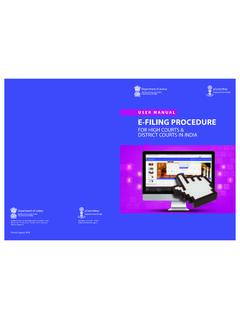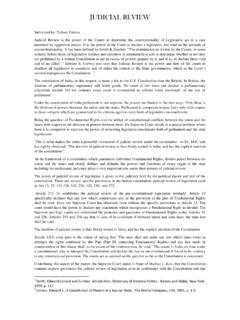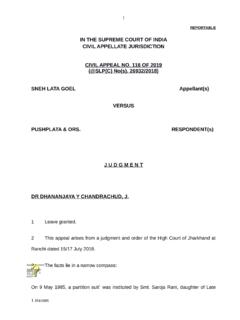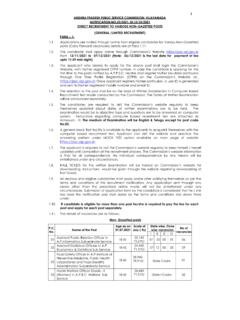Transcription of Contempt of Courts in India - MCRHRDI
1 Contempt of Courts in India Department of Law Osmania University Hyderabad. Unique position of Judiciary in Administration of Justice Role of Courts and judges in modern times Need for maintaining independence of judiciary Need to respect status and decisions of judiciary Duty of all authorities in India to assist the Courts in executing their orders Full faith and credit clause in the Constitution Possibility of willful disobeyance of Courts orders Tendency to lower image of judiciary Contempt of court - Meaning Anything that curtails or impairs the freedom of limits of the judicial proceedings Any conduct that tends to bring the authority and administration of Law into disrespect
2 Or disregard or to interfere with or prejudice parties or their witnesses during litigation. Consisting of words spoken or written which obstruct or tend to obstruct the administration of justice Publishing words which tend to bring the administration of Justice into Contempt , to prejudice the fair trial of any cause or matter which is the subject of Civil or Criminal proceeding or in anyway to obstruct the cause of Justice. Contempt of court Position Under the Constitution Constitution of India -Art. 129 :Supreme court to be a court of record. The Supreme court shall be a court of record and shall have all the powers of such a court including the power to punish for Contempt of itself.
3 : High Courts to be Courts of record. Every High court shall be a court of record and shall have all the powers of such a court including the power to punish for Contempt of itself. :Civil and judicial authorities to act in aid of the Supreme court . All authorities, civil and judicial, in the territory of India shall act in aid of the Supreme court . Law declared by Supreme court to be binding on all Courts . The law declared by the Supreme court shall be binding on all Courts within the territory of India . Contempt of court Position Under the Constitution 142. Enforcement of decrees and orders of Supreme court and orders as to discovery, etc.
4 (1) The Supreme court in the exercise of its jurisdiction may pass such decree or make such order as is necessary for doing complete justice in any cause or matter pending before it, and any decree so passed or order so made shall be enforceable throughout the territory of India in such manner as may be prescribed by or under any law made by Parliament and, until provision in that behalf is so made, in such manner as the President may by order prescribe. (1) Full faith and credit shall be given throughout the territory of India to public acts, records and judicial proceedings of the Union and of every State. The Contempt of Courts Act,1971 Objective: To define & limit powers of certain Courts in punishing Contempt of Courts & to uphold the majesty and dignity of law Courts and their image in the minds of the public is no way whittled down.
5 Contempt of court " - civil Contempt or criminal Contempt . Civil Contempt " - willful disobedience to any judgment, decree, direction, order, writ or other process of a court or willful breach of an undertaking given to a court ; [Sec. 2 (b)] Criminal Contempt " - publication (whether by words. spoken or written, or by signs, or by visible representations, or otherwise) of any matter or the doing of any other act whatsoever which- (i) scandalizes or tends to scandalize, or lowers or tends to lower the authority of, any court ; or (ii) prejudices, or interferes or tends to interfere with, the due course of any judicial proceeding; or (iii) interferes or tends to interfere with, or obstructs or tends to obstruct, the administration of justice in any other manner ; [Sec.]
6 2 (c)] The Contempt of Courts Act,1971-Salient Features Innocent publication and distribution of matter - not Contempt ( ) Fair and accurate report of judicial proceeding - not Contempt (Sec 4) Fair criticism of judicial act - not Contempt ( ) Complaint against presiding officers of subordinate Courts when not Contempt - in respect of any statement made by him in good faith ( ) Publication of information relating to proceedings in chambers or in camera - not Contempt except in certain cases (Sec 7 ) Act not to imply enlargement of scope of Contempt (Sec 9.)- Due regard to Constitutional Provisions The Contempt of Courts Act,1971 Power of High court to punish Contempt of subordinate Courts - Every High court shall have and exercise the same jurisdiction, powers and authority, in accordance with the same procedure and practice, in respect of Contempt of Courts subordinate to it as it has and exercises in respect of Contempt of itself : Provided that no High court shall take cognizance of a Contempt alleged to have been committed in respect of a court subordinate to it where such Contempt is an offence punishable under the Indian Penal Code.
7 (45 of 1860) [ ] Punishment for Contempt of Courts * Power of High court to try offences committed or offenders found outside jurisdiction ( ) Punishment for Contempt of court (1) Save as otherwise expressly provided in this Act or in any other law, a Contempt of court may be punished with simple imprisonment for a term which may extend to six months, or with fine which may extend to two thousand rupees, or with both. : Provided that the accused may be discharged or the punishment awarded may be remitted on apology being made to the satisfaction of the court . apology shall not be rejected merely on the ground that it is qualified or conditional if the accused makes it bona fide.
8 [ ] Essentials of civil Contempt of court 1. the making of a valid court order, 2. knowledge of the order by respondent, 3. ability of the respondent to render compliance, and 4. willful disobedience of the order. Limitation period for initiating Contempt proceedings The Limitation period for actions of Contempt is a period of one year from the date on which the Contempt is alleged to have been committed [u/S. 20 of the Act ] Cognizance of criminal Contempt in other cases Cognizance of criminal Contempt in other cases. (1) In the case of a criminal Contempt , other than a Contempt referred to in section 14, the Supreme court or the High court may take action on its own motion or on a motion made by- (a) the Advocate-General, or (b) any other person, with the consent in writing of the Advocate General (2)
9 In the case of any criminal Contempt of a subordinate court , the High court may take action on a reference made to it by the subordinate court or on a motion made by the Advocate-General or, in relation to a Union territory, by such Law Officer as the Central Government may, by notification in the Official Gazette, specify in this behalf. [ ] Procedure after cognizance Procedure after cognizance. (1) Notice of every proceeding under section 15 shall be served personally on the person charged, unless the court for reasons to be recorded directs otherwise [ ] Procedure to decide Contempt of court Hearing of cases of criminal Contempt to be by Benches.
10 (1) Every case of criminal Contempt under section 15 shall be heard and determined by a Bench of not less than two Judges. [Sec 18 ] Appeals. Appeals. (1) An appeal shall lie as of right from any order or decision of High court in the exercise of its jurisdiction to punish for Contempt - (a) where the order or decision is that of a single Judge, to a Bench of not less than two Judges of the court ; (b) where the order or decision is that of a Bench, to the Supreme court : [Sec. 19] Limitation for Appeal An appeal under sub-section (1) shall be filed- (a) in the case of an appeal to a Bench of the High court , within thirty days ; (b) in the case of an appeal to the Supreme court , within sixty days, from the date of the order appealed against.
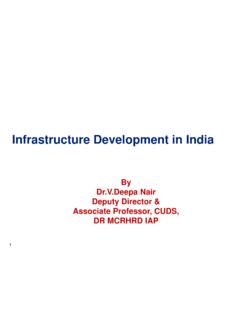
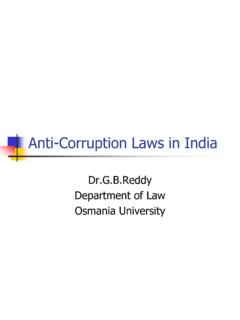

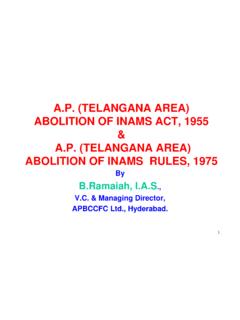
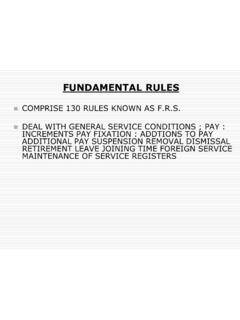



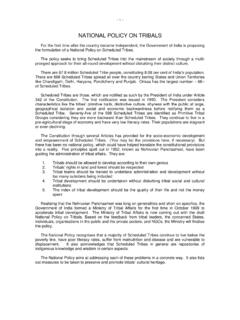


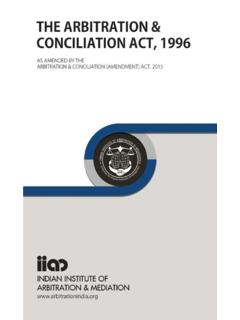
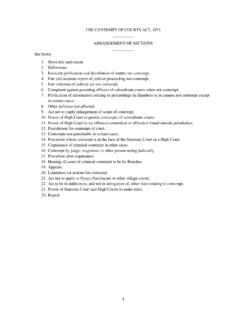

![SUBJECTWISE PRELIMS TEST SERIES 4.0, 2022 [FULL PACKAGE]](/cache/preview/e/6/c/8/c/2/6/8/thumb-e6c8c268e1cdc4dc4117f12593631c6e.jpg)
